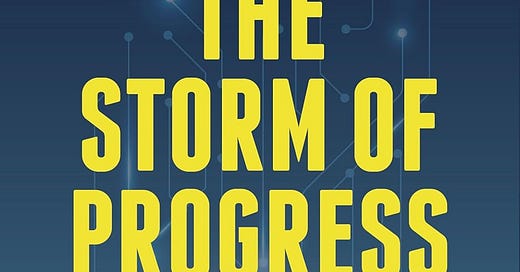For a long time, I’ve been dismayed by humanity’s foot-dragging when it comes to taking meaningful action to confront looming threats like climate change. Wade Rowland’s The Storm of Progress: Climate Change, AI, and the Roots of Our Dangerous Ethical Myopia provides some thought-provoking ideas about how we got where we are, and what is needed going forward.
Rowland gets right to the point in the book’s Preface, introducing The Storm of Progress as a “series of interconnected essays inquiring into a central issue,” that issue being, “the threat posed by modern technologies to the habitability of our planet and the future of its human population.”
Part of that inquiry involves delving into the historical context, and “looking critically into the ideas that shaped Western societies in the wake of the momentous era of intellectual ferment called the Enlightenment.”
“The Storm of Progress revisits the beliefs of philosophers like Hume, Kant, and others, discussing not only their key philosophies, but also how these philosophies shaped societal and cultural beliefs.”
The Storm of Progress revisits the beliefs of philosophers like Hume, Kant, and others, discussing not only their key philosophies, but also how these philosophies shaped societal and cultural beliefs. Rowland explores the evolution of Western thought around economics, free market thinking and capitalism, and argues that one of the key problems is humanity’s focus on technology and science as good things in and of themselves, rather than questioning what we really need and how to exist in harmony with the natural world.
Rowland highlights the rise of “cyber-corporations,” organizations in which the use of AI and algorithms have taken over some of the decision-making processes, as a danger, particularly when corporations become a “machine-like, self-regulating organism . . . designed to maximize the value of the assets under its control, on behalf of its shareholders.” In such a scenario, we shouldn’t be surprised that many large, publicly traded corporations are guided by pure profit rather than concern about the climate, the environment, or other issues.
Humanity’s focus on technological advances hasn’t been all bad. As Rowland points out, prosperity and longer life spans have been offered to some portions of society, at least, as a result of technology and science. However, the lack of ethical oversight and the belief that technology is beneficial in and of itself has led to problems. Rowland argues that part of the reason we’re in the mess we’re in today has to do with “a dwindling ability to think clearly about ethics and values in the face of the undeniable successes of our scientistic worldview.” He advocates for a new approach, which he refers to as critical moral realism, with the ultimate goal being the ability to make “sustainable, common-sense choices.”
Many of Rowland’s arguments resonated with me. In my younger days, I enjoyed canoeing and camping. In these settings, I often came face to face with the disparity between what we really need and what we think we need. Back-country canoeing, in particular, brings the realization that so much of what we surround ourselves with in our daily lives isn’t really necessary.
But the pervasive advertising that confronts us daily doesn’t encourage asking questions like, “do I really need this?” Instead we are constantly bombarded with ads that encourage us to buy more, consume more, spend more, travel more, and so on.
The Storm of Progress was both enlightening and chilling. It made me realize that overcoming issues like climate change isn’t just a matter of convincing people it’s a problem. There are many powerful forces that are invested in maintaining the status quo.
Perhaps the scariest part of the book for me was the inference that mega-corporations see profit generation as their reason to exist, regardless of the ultimate cost paid by others (so much for “corporate social responsibility,” which some organizations see as a dangerous idea that runs counter to their reason for existence). Making meaningful change will be a steep hill to climb. But, as Rowland says, recognizing the importance of ethical and moral questioning is a step in the right direction. Anyone who is concerned about climate change and the danger of the untrammeled rise of artificial intelligence should find The Storm of Progress an interesting and thought-provoking read.
About the Author
Wade Rowland is emeritus professor of media and communication studies at York University, Toronto. Among more than a dozen previous books are: Greed, Inc.: Why Corporations Rule Our World and How We Let It Happen; Galileo's Mistake; and Canada Lives Here: The Case for Public Broadcasting (LLP 2016). He lives with his artist wife Christine Collie Rowland in rural Port Hope, in the Northumberland hills of Eastern Ontario.
About the Reviewer
Lisa Timpf is a retired HR and communications professional who lives in Simcoe, Ontario. Her poetry, fiction, creative nonfiction, and book reviews have appeared in New Myths, Star*Line, The Future Fire, and other venues. Lisa’s speculative haibun collection, In Days to Come, is available from Hiraeth Publishing. You can find out more about Lisa’s writing and artwork at http://lisatimpf.blogspot.com/
Book Details
Publisher : Linda Leith Publishing (Jan. 20 2024)
Language : English
Paperback : 190 pages
ISBN-10 : 1773901494
ISBN-13 : 978-1773901497
.





